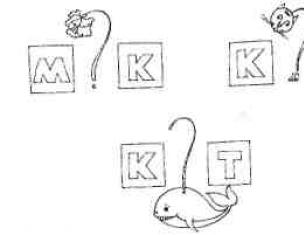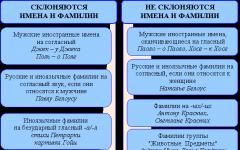“To Chaadaev” Alexander Pushkin
Love, hope, quiet glory
Deception did not last long for us,
The youthful fun has disappeared
Like a dream, like morning fog;
But the desire still burns within us,
Under the yoke of fatal power
With an impatient soul
Let us heed the calling of the Fatherland.
We wait with languid hope
Holy moments of freedom
How a young lover waits
Minutes of a faithful date.
While we are burning with freedom,
While hearts are alive for honor,
My friend, let's dedicate it to the fatherland
Beautiful impulses from the soul!
Comrade, believe: she will rise,
Star of captivating happiness,
Russia will wake up from its sleep,
And on the ruins of autocracy
They will write our names!
Analysis of Pushkin’s poem “To Chaadaev”
The poem “To Chaadaev,” written by Pushkin in 1818, is still considered the literary anthem of the Decembrists. This work has a rather unusual history, since the author did not plan for its publication. However, written down from the poet’s words during a reading in a narrow circle of friends, the poem “To Chaadaev” began to be passed from hand to hand until it was published, with some distortions, in the almanac “Northern Star” only in 1929. Nevertheless, it was thanks to this work that Alexander Pushkin, who was friendly with many Decembrists, gained the reputation of a freethinker, as a result of which the poet twice went into exile, where he was sent by Tsar Alexander I, who did not want the poet to “confuse minds” with his poems. high society.
Pyotr Chaadaev was an old friend of Pushkin, with whom the poet had not only a warm and trusting relationship, but also common aspirations. As a lyceum student, Pushkin loved to talk for a long time with Chaadaev, who by that time was already a student at Moscow University, discussing with a friend the political situation in Russia. With age, the friendship only strengthened, and Pyotr Chaadaev was one of the few to whom Pushkin trusted his deepest dreams and desires. An example of this is the poem “To Chaadaev,” the first lines of which contain a hint of the carefree youth of two young people, intoxicated by their literary successes and public recognition. Besides, between the lines in the first quatrain one can see obvious disappointment with the reign of Alexander I, who proclaimed himself a liberal and reformer, but his regime was marked by a harsh period of reaction, repression and the subsequent suppression of the Decembrist uprising.
Further, the poet notes that imaginary glory and youthful maximalism could not kill in his soul the desire to change the world for the better and rid Russia of autocracy. At the same time, Alexander Pushkin draws the attention of readers to the fact that the abolition of serfdom, which was verbally proclaimed by the tsarist regime, has not yet happened. “We wait with languid hope for the moment of holy freedom,” the poet writes, implying that his generation has not yet lost hope for a change in the political system. At the same time, Pushkin understands that neither the tsar nor his entourage, mired in vices, will ever agree to make voluntary concessions.
That is why the last lines of the poem “To Chaadaev” contain an open call for the overthrow of the autocracy. It is noteworthy that such an idea, voiced in Pushkin’s work, was expressed so openly and boldly for the first time. The young poet, who by this time had already stopped believing the tsar’s numerous promises, did not intend to advertise his point of view. And this fact is confirmed by many biographers of Pushkin, noting that the poem “To Chaadaev” was delivered to the addressee, and soon Pushkin himself simply forgot about the existence of this masterpiece of literary freethinking. By that time, Pyotr Chaadaev was not only a member of the secret Masonic lodge, but also managed to join the society of future Decembrists called the “Union of Prosperity.” Its participants perceived Pushkin’s poem as a call to action, believing that “our names will be written on the ruins of autocracy.” Subsequently, when the conspiracy against the tsar was discovered, and many representatives of famous noble families went to Siberia, Alexander Pushkin repeatedly reproached himself for his carelessness and regretted that he could not share the fate of people who were close to him in spirit, rightly believing that it was the poem “To Chaadaev" forced the Decembrists to attempt a coup. Therefore, Pushkin’s name is inextricably linked with the Decembrists, whom he inspired to openly fight against the autocracy, which was later sung by many Russian poets.
History of creation. The poem was written in 1818 - during the St. Petersburg period of Pushkin’s work. It became widely known, especially in Decembrist circles, and began to be distributed in lists. It was for these poems that Pushkin fell into disgrace - he ended up in southern exile. Much later, in 1829, without the poet’s knowledge, this poem was published in a distorted form in the almanac “Northern Star”.
The poem is addressed to a specific person: Pyotr Yakovlevich Chaadaev (1794-1856), one of Pushkin’s close friends from his lyceum years. In addition to this poem, Pushkin’s messages to “Chaadaev” (1821), “Chaadaev” (1824) were addressed to him. The poet had a long-term friendship with Chaadaev: they were both characterized by freedom-loving sentiments, a desire to change life in Russia, and unconventional thinking. Chaadaev, like many of the poet’s lyceum friends, was a member of the secret Decembrist society “Union of Prosperity,” although he subsequently distanced himself from this movement, taking his own very unique position on the issue of state power and future fate Russia, For the publication " Philosophical writing”, in which these views were set out, Chaadaev was declared crazy by the government - this is how the autocracy fought against dissent and love of freedom. Pushkin’s positions, especially in his mature years, did not always coincide with the thoughts of Chaadaev, but in 1818 the young poet saw in his older friend a man wise with life experience, endowed with a sharp and sometimes sarcastic mind, and most importantly, with freedom-loving ideals that were so in keeping with Pushkin’s mood.
Genre and composition.
Pushkin's lyrics are characterized by a desire to transform established genres. In this poem we see a manifestation of such innovation: a friendly message addressed to a specific person develops into a civil appeal to the entire generation, which also includes the features of an elegy. Typically, a poem in the genre of a message is addressed either to a friend or to a lover and is related in theme to intimate lyrics. By changing the addressee of his poem, Pushkin creates a work that is new in genre - a civil message. That is why its construction is based on an appeal to comrades: “Comrade, believe...”, stylistically close to the civil political poems of the times of the Great French Revolution. But at the same time, the composition of the poem, constructed as a thesis - antithesis, implies the presence of contrast. This is exactly how poetic thought develops: from an elegiac beginning, imbued with a mood of sadness and sadness, through the adversative conjunction “but” (“But desire still burns within us...”), the first elegiac part is connected to the second, completely different in mood, feeling and thought. : civil themes and an accusatory attitude prevail here. And the conclusion of the poem, summing up the development of poetic thought, sounds with a bright major chord: “My friend, let us dedicate our souls to the beautiful impulses!”
Main themes and ideas. main idea the poems are a call to like-minded people to move away from private interests and turn to civic issues. Associated with it is the poet’s belief that freedom-loving dreams will be realized, and “the fatherland will awaken from its sleep.” At the end of the poem there is a very rare idea in Pushkin’s work of breaking the whole state system, which, according to the poet, will happen in the near future (“And on the ruins of autocracy / They will write our names!”). The statist poet more often called for gradual changes, coming primarily from the authorities themselves, as in the poems “Liberty” and “Village”. It can be considered that such a radical position of the author in the poem “To Chaadaev” is evidence of youthful maximalism and a tribute to romantic sentiments. The general pathos of the poem is civil, but it contains elements of romantic and elegiac pathos, especially in the first part, which is reflected in the specificity of a number of images.
For the first time in this poem, a combination of civil themes with intimate ones - love and friendship, characteristic of Pushkin's later work - appears. In this regard, the poet raises the problems of civic duty and political freedom in conjunction with issues of individual freedom and privacy person, which sounded extremely unusual at the time. Let us consider how poetic thought develops. The beginning is imbued with elegiac moods. The lyrical hero, turning to his soulmate, sadly recalls that many of his former ideals turned out to be “deception”, “a dream”:
Love, hope, quiet glory
Deception did not last long for us,
The youthful fun has disappeared
Like a dream, like morning fog.
All poetic vocabulary, all the imagery of the first quatrain is built in the style of romantic elegies: quiet, gentle, sleep, morning fog. What remains of the days of vanished youth? There is no longer any love or hope. But it seems that there is some word missing in this familiar triad? Of course, the first word of this stable combination, “faith,” is missing. This key word will appear in the poem - it is left for the final, shock ending in order to give it the character of a special, almost religious inspiration and conviction. But the transition from a pessimistic tonality to a major sound occurs gradually. This transition is associated with images of combustion, fire. Typically, the likening of passionate desire to fire was characteristic of love lyrics. Pushkin introduces a completely different sound into the fire motif: it is associated with a civil appeal, a protest against the “oppression of the fatal power”:
But the desire still burns within us,
Under the yoke of fatal power
With an impatient soul
Let us heed the calling of the Fatherland.
What follows is such an unexpected comparison that not all, even the Decembrist friends who were close in their way of thinking and spirit, accepted it. It was believed that the comparison of civil life with private life, the combination of high patriotic motives with sentimental ones was unacceptable. But in this poem Pushkin chooses a truly innovative move: he combines the concepts of “freedom” and “love” into a single and inextricable image. Thus, he shows that love of freedom and civic aspirations are as natural and inherent in every person, as his most intimate feelings - friendship and love:
We wait with languid hope
Holy moments of freedom
How a young lover waits
Minutes of a faithful date.
And then it is already quite logical for the combustion image to move from the region love feelings in the sphere of civic motives:
While we are burning with freedom,
While hearts are alive for honor,
My friend, let's dedicate it to the fatherland
Souls have wonderful impulses.
It is now obvious that the appeal to a friend has grown into a call for faith in the ideals of freedom and the possibility of achieving them, addressed to the entire young generation of Russia. It is not without reason that in the last quatrain another, higher word is used - “friend” is replaced by “comrade”. A poetic image“Stars of captivating happiness”, which concludes the poem, becomes a symbol of hopes for the triumph of the ideals of civil freedom.
Artistic originality. The message “To Chaadaev” is written in Pushkin’s favorite meter - iambic tetrameter. In addition to genre innovation, which is associated with the peculiarities of the development of the author’s thought and the construction of the poem, it is distinguished by its unusual artistic imagery. This is a marked comparison of the desire for “holy freedom” and love; metaphorical images of “burning”, romantic epithets (“under the yoke of fatal power”, “moments of holy freedom”), high-style metonymy (“Russia will rise from sleep”). Particular attention should be paid to the symbolic image of the star - “the star of captivating happiness”, which entered not only Russian literature, but also became an element of the consciousness of Russian society.
The meaning of the work. The poem became a milestone for Pushkin’s work, identifying the most important theme of freedom for his poetry, as well as its special interpretation. In the history of Russian literature, it was the beginning of a tradition of combining civil, freedom-loving and intimate themes, which is confirmed by the works of Lermontov, Nekrasov, and the novelistic literature of the second half of the 19th century century, and then moves on to such poets of the 20th century as Blok.
Love, hope, quiet glory
Deception did not last long for us,
The youthful fun has disappeared
Like a dream, like morning fog;
But the desire still burns within us,
Under the yoke of fatal power
With an impatient soul
Let us heed the calling of the Fatherland.
We wait with languid hope
Holy moments of freedom
How a young lover waits
Minutes of a faithful date.
While we are burning with freedom,
While hearts are alive for honor,
My friend, let's dedicate it to the fatherland
Beautiful impulses from the soul!
Comrade, believe: she will rise,
Star of captivating happiness,
Russia will wake up from its sleep,
And on the ruins of autocracy
They will write our names!
Analysis of the poem “To Chaadaev” by Pushkin
The poem “To Chaadaev” was of great importance in the destinies of Pushkin himself and many of his close friends. Perhaps it influenced the entire Decembrist movement. The work was written by the poet in a very early age. In 1818, he turned to his old and very good friend with a message. Pushkin did not intend to publish this poem, as he perfectly understood the danger of all possible consequences. Against his will, the work began to spread quickly. His sharp focus made him extremely popular in anti-government circles. The authorities quickly identified the author of the “inadmissible” poems. Pushkin was sent into exile. For the rest of his life he becomes an object of official suspicion. In the democratic and revolutionary camp, the emergence of a new fighter for freedom and justice is glorified.
It is no secret that long before the Decembrist uprising, there was talk among educated young people about the need for fundamental changes. Alexander I himself, having ascended the throne, unwittingly supported the seditious plans, declaring his desire for radical reforms. Young Pushkin and Chaadaev spent a lot of time in political conversations, painting a picture of a fair government system. After the defeat of Napoleon, sobering gradually comes. The Emperor shows that he does not intend to weaken the power of his autocratic power.
Pushkin boldly expresses his views in the poem. He calls past dreams “youthful pastimes” that gradually disappeared. But “under the yoke of the fatal power” hope remained. Pushkin and the future Decembrists sincerely believed in the need to resist tyranny. They acted not for personal goals and interests, but for the well-being of their homeland.
Pushkin compares the overthrow of the autocracy with the rise of the “star of captivating happiness.” This will mean the awakening of Russia to a new life. Pushkin considers the perpetuation of his memory by his descendants (“they will write our names”) to be the main reward for his selfless struggle against evil and injustice.
The work became a real anthem of the Decembrists. After the decree of exile, Pushkin unwittingly becomes the first victim of the future uprising. It is likely that many Decembrists changed their views to more radical ones under the influence of the poem and the reaction that followed it. great poet communicated closely with all future rebels and could well have shared their fate. It is known that the Decembrists did not specifically involve him in their plans, as they understood the importance of the poet for Russia.
Pushkin’s poem “To Chaadaev” dates back to 1818 - it was dedicated to to the best friend the poet and was a kind of personal letter, not intended for publication. However, in a short time it gained very wide popularity among the poet’s circle of acquaintances, among whom there were many Decembrists (according to one version, “To Chaadaev” pushed the rebels to openly express their discontent). The poem was rewritten and passed from hand to hand, which ultimately led to distortions. Eleven years after it was written (1829), the work was published with a number of differences from the original.
It’s easy to guess why the poet was in no hurry to publish the dedication to Chaadaev - it directly expresses dissatisfaction with the autocracy and boldly predicts the scrapping of “autocracy.” At the same time, acutely political topics are framed in a friendly tone - lyrical hero shares his thoughts with a person who understands him well, and therefore allows himself sincerity that is dangerous for publicity. He wants Russia to be as free as he himself is in this letter - to be able to speak openly and not hold back “the beautiful impulses of the soul.” Iambic tetrameter, together with cross rhyme and exclamatory intonations, give the poem a dynamic pace, due to which it sounds inviting and solemn.
Below you can read the text of Pushkin’s poem “To Chaadaev”:
Love, hope, quiet glory
Deception did not last long for us,
The youthful fun has disappeared
Like a dream, like morning fog;
But the desire still burns within us,
Under the yoke of fatal power
With an impatient soul
Let us heed the calling of the Fatherland.
We wait with languid hope
Holy moments of freedom
How a young lover waits
Minutes of a faithful date.
While we are burning with freedom,
While hearts are alive for honor,
My friend, let's dedicate it to the fatherland
Beautiful impulses from the soul!
Comrade, believe: she will rise,
Russia will wake up from its sleep,
And on the ruins of autocracy
They will write our names!
This is the message in poetic form Pushkin to his close friend Pyotr Chaadaev. The poet valued his friendship very much, trusted him endlessly and shared with him his secret thoughts and desires. Therefore, it is to him that he writes about the changes that have happened to him and recalls the time of his youth when they talked a lot and dreamed of glory and service to the fatherland. And now all these dreams have dissipated and shattered into bitter reality.
The poem was written during the reign of Alexander I, who at first positioned himself as a liberal and reformer, but his entire reign was accompanied by severe repression. And the poet realized that nothing good will happen as long as autocracy reigns in the country.
At the same time, he notices that the desire to change to better fate Motherland. And not everything is lost yet, there is a desire and faith in the freedom that will definitely come. The poet compares his love for his homeland with the feeling of a lover before his first date. He is in joyful excitement and anticipation.
These poems were not written for publication. But when Chaadaev read it to a close circle of his friends, they liked it so much that they immediately began to rewrite it and pass it from hand to hand. As a result, this message began to circulate throughout the country, exciting minds. It became a kind of civil message to the best representatives of enlightened youth. Here for the first time Pushkin openly calls for the overthrow of the autocracy.
The idea of faith in victory over autocracy was so inspiring that this work became the unofficial anthem of the Decembrists, among whom were many of the poet’s friends.
And later, after the brutal suppression of the uprising, Pushkin reproached himself for the fact that his message played a certain role in the final decision of the members secret society"Union of Welfare" enter Senate Square.
Analysis of the poem To Chaadaev by Pushkin for grade 9
The genre of this poem by A.S. Pushkin - a friendly message addressed to his friend from the Tsarskoye Selo Lyceum, Pyotr Yakovlevich Chaadaev. A feature of this genre is the free form of expression of one’s thoughts; in addition to the addressee, it most often implied an appeal to the reader. Speaking about Chaadaev’s personality, it should be noted that he was distinguished by democratic views and was a defender of individual freedom.
The peculiarity of this message is that it combines a personal view of events with patriotic and civic appeals. The poet is convinced of the coming freedom.
The plot of the poem is the formation of an individual as a citizen, the formation of his civic position. At the beginning of the poem, youthful dreams and aspirations collide with real life:
Love, hope, quiet glory
Deception did not last us long...
They are short-lived and disappear like morning mist.
All subsequent lines of the poem sound like the antithesis to the first quatrain. The poet and his contemporaries, despite the “oppression of power,” have a desire to serve the Fatherland.
Only now we have before us a poet-citizen who is waiting for a moment of freedom, like a young lover waiting for the minutes of a faithful date. A.S. In this poem, Pushkin directly expresses his civic position, calling on his comrade and contemporaries to devote their “beautiful impulses” to serving the “Fatherland” of their souls. He hopes and encourages people to believe that Russia is able to awaken from sleep, and the reward for serving the Motherland will be freedom and the memory of those who fought to achieve this freedom.
And on the ruins of autocracy
They will write our names!
When writing the message, the author uses a broadly civil vocabulary close in spirit to the Decembrists (“power”, “freedom”, “fatherland”, “autocracy”, “comrade”, “oppression”) and addresses to the interlocutor characteristic of the genre of the message. The rhyme of the poem is cross, the meter is iambic tetrameter, giving the sound clarity, precision and accuracy.
In the poem the author used artistic media: epithets, “beautiful impulses”, personification “Russia will rise up”, metaphors “star of captivating happiness”, comparisons “like a dream”, etc. The work contains such stylistic figures as inversion (“the liberties of the saint”) and unity of command (“for now... for now...").
Analysis of the poem To Chaadaev according to plan
You might be interested
- Analysis of Mandelstam's poem Notre Dame (Notre Dame)
"Notre Dame" was written in 1912 by the young Osip, and was also one of the poems that became part of his collection Stone in 1916. In 1913, the work was written as an appendix
- Analysis of the poem Epiphany night is frosty Feta
The poem “Epiphany Night is Frosty” is one of Fet’s works, and it was written around 1842.
- Analysis of the poem Russian language by Turgenev
So, in one of his poems, Ivan Sergeevich raised the problem native language. He considered him his “support and hope” and believed in him. And although he lived abroad then, he was always worried about fate
- Analysis of Zhukovsky's poem The Arrival of Spring 7th grade essay
Many poets wrote about the seasons, and the beauties of Russian nature Vasily Andreevich Zhukovsky was no exception. The writer loved to translate poems from German language Freelance writer Ludwig Uhland







